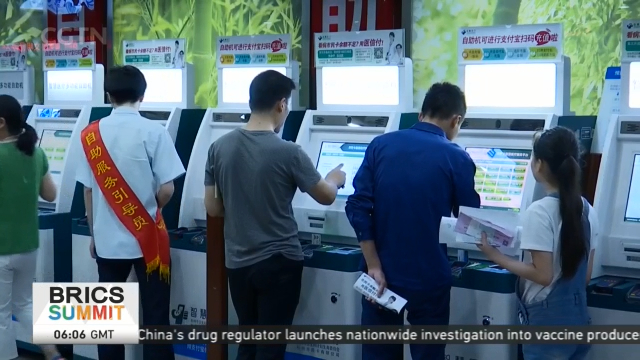
14:34, 26-Jul-2018
BRICS Summit: A.I. and tech dev't on agenda, Hangzhou's smart city an example
Updated
14:09, 29-Jul-2018
03:41

The BRICS Summit in South Africa promises lively discussions on many issues, especially the fourth industrial revolution and artificial intelligence. But what about smart cities? How can BRICS member countries weave new tech into everyday life. CGTN's Wu Lei goes to East China's Hangzhou, one of China's smartest cities, and shows us what went into its development.
After years of promoting digital life, today people in Hangzhou can feel the transformative effects of technology in nearly everything they do. Wang Juan says medical services are a must for her family. She says long lines, stressful wait times, huge crowds – the worst things about doctor visits – are now memories in Hangzhou.
WANG JUAN HANGZHOU RESIDENT "It is so convenient now. You can register for doctor services on your smart phone at any time, without lining up and waiting. You can also pay medical treatment costs and check examination results through these smart devices behind me."
At one of city's best, but busiest hospitals, doctors are also applying the latest technology to assist community doctors elsewhere. They offer remote consultations, and some other doctors are also using voice recognition technologies to improve medical and prescription filing.
DR. SHENG WENBIN HANGZHOU FIRST PEOPLE'S HOSPITAL "For doctors, internet technology upgrades play an increasingly important role in medical treatment. It is vital to get access to patients' related medical records at our hospital as well as at other hospitals."
Digital technology has also helped the city set up China's first Internet court. People no longer need to physically show up in court to settle lawsuits. Many say this Internet court saves a lot of time and money.
HUANG XIN JUDGE, HANGZHOU INTERNET COURT "Generally I handle about 25 cases a week. Efficiency has been largely improved, we have handled over 10 thousand cases since last May."
Hangzhou's re-invention as a digital and smart city is an example for other domestic and global cities to follow. Tech firms here have worked closely with public services. For example, tech giant Alibaba has developed an artificially intelligent system called City Brain to help ease traffic congestion by working with local traffic police.
MIN WANLI CHIEF SCIENTIST, ALI CLOUD, ALIBABA GROUP "It managed to cut down the travel time of the CBD area in Hangzhou city. It reduced travel time for cars, trucks and buses by 15%, and by about half for emergency vehicles like ambulances. That's thanks in large part to city brain, which has a prediction about the future traffic conditions across the entire city."
WU LEI HANGZHOU "With the help of big data and cloud computing technology, this City Brain system will initially monitor traffic, but will also inform authorities on how to better manage energy, security and public safety in the urban area."
Chief Scientist Min Wanli says one of the key factors for building a smart city is to use big data to its fullest. That requires high collaboration of government design and tech firm technology. After all, the smart city is set to apply these high-tech services to make people's lives more convenient and enjoyable. WL, CGTN, Hangzhou, Zhejiang province.

SITEMAP
Copyright © 2018 CGTN. Beijing ICP prepared NO.16065310-3
Copyright © 2018 CGTN. Beijing ICP prepared NO.16065310-3